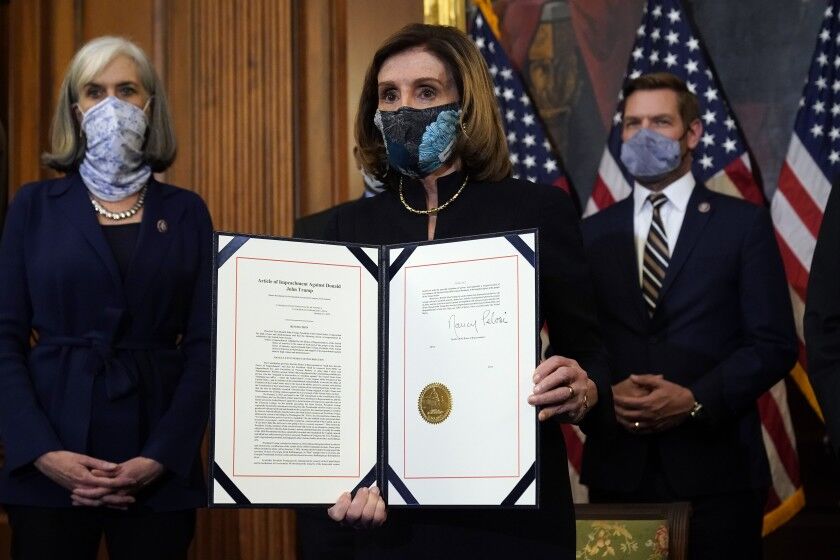Where Democrats Went Wrong During Trump’s Trial
Nancy Pelosi introducing the Articles of Impeachment against Donald Trump.
February 24, 2021
This past Saturday – to the surprise of no one – former President Trump was acquitted by a vote of 57-43 in the Senate on the charge of inciting the Jan. 6 siege on the Capitol, which brought a gaggle of armed yahoos and preening social media influencers within a hair’s breadth of our nation’s lawmakers.
The proceedings of the impeachment trial went just as one might have expected. House impeachment managers, led by Rep. Jamie Raskin (D-MD), provided emotionally resonant firsthand accounts of the attack and slickly-edited video montages to drive home Trump’s egging on of the volatile crowd of his enraptured followers, not only on the fateful day in question, but also during the weeks leading up to it.
While it’s a stretch to say that Trump explicitly directed his followers to commit violence, no serious person could fail to see how his statements led many to believe they were acting on his behalf. Encouragement of his followers to “fight like hell,” to stage a “wild” protest and “go by very different rules” amid a “fraud” was grossly irresponsible. Especially when threats and plans for violence had been publicly circulating online for weeks before January 6.
Other facts raised by the impeachment managers demonstrate that Trump was, at best, unconcerned by the attack. This includes his bashing of former Vice President Mike Pence on Twitter mere minutes after learning his life was in danger. Meanwhile, other evidence, such as his reported comment to Kevin McCarthy that the rioters were “more upset about the election than you are,” his hesitancy to call them off, and his cloying video message saying “We love you” and “You are very special” to them, indicate that he, in fact, approved of the attack.
Yet, all of this overwhelming evidence felt entirely incidental to the actual mechanic of government that was set in motion last week. The ostensible goal of this impeachment – to bar Trump from running for future office – was dead on arrival. The vast bulk of the Republican Party, save for a few already hated stragglers in the mold of Liz Cheney or Mitt Romney, has tied itself to Trump. And given that his approval with Republican voters is still 81% according to a recent Politico poll, they are clearly right about where the wind is and has been blowing for the past four years. An unprecedented act of mass political suicide notwithstanding, a conviction in the Senate was always a pipe dream.
Understanding this makes the impeachment last week feel less like a concrete political maneuver on the part of Democrats inclined toward a meaningful result and more like a grotesque act of political theater, or a sporting event to give the masses something else to chatter about besides the monstrous reality of living in America in 2021 and the hesitancy of the Biden administration to do much of anything about it.
The first 100 days of Joe Biden’s term came with perhaps the most urgent set of political crises to beset a new president since at least Franklin Roosevelt, if not Lincoln. At the time of the impeachment vote in the House, COVID-19 was ripping through the country at record rates, killing nearly 3,000 Americans per day. Meanwhile, unemployment was greater than 6 percent. 12 million Americans owed more than $6,000 in back-rent. More than three million people (and possibly far more depending on the study) had lost their employer-based health insurance. Millions of Americans entered food bank lines for the first time in their lives.
While pointlessly relitigating Jan. 6 became the focus of the newly-minted Democratic Senate, priorities like passing the desperately needed stimulus package Biden proposed were pushed to mid-March. This is to say nothing of the fact that Democrats have needlessly winnowed down their stimulus proposal at multiple points, reducing the size of the checks from the promised $2,000 to $1,400 and making those with incomes between $50,000 and $75,000 ineligible after they had received $600 checks under Trump.
Meanwhile, Biden has backtracked on other promises made on the campaign trail to drowning low and middle-income Americans. He has abandoned passing a $15 minimum wage as part of a stimulus package on procedural grounds despite having the ability to do so with 51 votes through budget reconciliation. Likewise, he insists on pushing his plan to cancel $10,000 worth of federal student debt (far less than the $50,000 or more he could unilaterally cancel) through regular order in Congress, which will surely lead it to be winnowed down further by Republicans and Democratic budget hawks like Joe Manchin.
It is in this context of dither and delay where the impeachment of Trump felt less like a moral end unto itself and more like a diversion meant to compensate for the lack of material aid Americans desperately need.
Democrats have control over the levers of government by the slimmest of margins and cannot waste a moment more waving the bloody shirt from Jan. 6. If they truly want to banish the eldritch horror of Trumpism to the dustbin of history – as they claimed to during impeachment – and constitute a new majority, they must come through on the material promises that Americans elected them to deliver.







